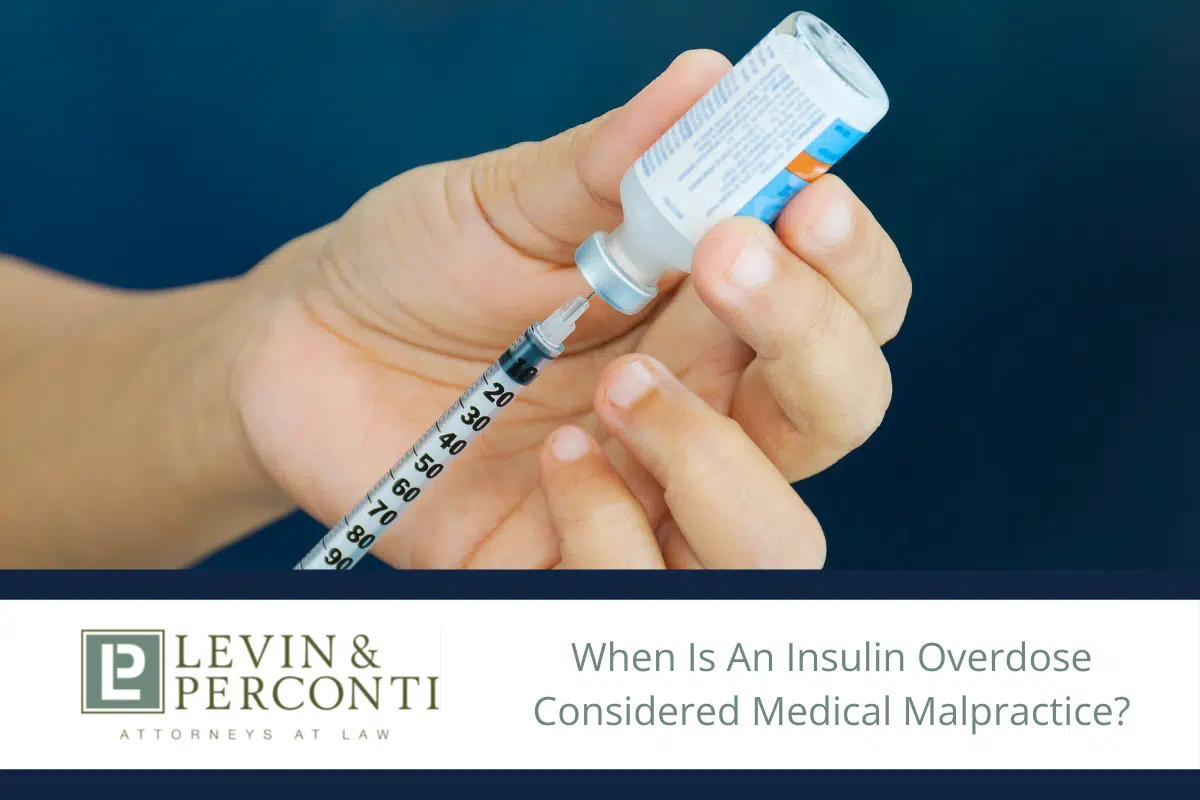Insulin overdose can cause severe hypoglycemia—a dangerous drop in blood sugar that can lead to permanent brain injuries, organ damage, coma, and death. Insulin medication errors can occur when health care providers prescribe, dispense, and administer insulin in home health and institutional settings, including hospitals and nursing homes. When a patient suffers harm because of a preventable insulin medication error, an insulin overdose may constitute a form of medical malpractice.
Since 1992, our experienced medication error attorneys have built a national reputation for getting outstanding results. We have recovered over $2 billion in settlements and verdicts, and our knowledge of federal and state medical malpractice law is unmatched. Attorneys throughout the nation refer their complicated medical malpractice cases to us. Contact us today if you or your loved one has been harmed by an insulin overdose.
What Is An Insulin Overdose and What Are the Consequences?
An insulin overdose occurs when a patient receives an inappropriately high dose of insulin beyond the amount necessary for blood glucose control. It occurs as a result of the following:
- Dosages administered too close together
- Inappropriately high doses given
- Incorrect type of insulin dispensed
- Incorrect method of administration
What Happens If You Overdose on Insulin?
An insulin overdose can lead to a rapid drop in blood sugar, often to dangerously low levels. A blood glucose level below 70 mg/dL is known as hypoglycemia. According to Diabetes.org, insulin overdose symptoms include the following:
- Shakiness
- Anxiety
- Sweating
- Chills
- Confusion
- Rapid heartbeat
- Dizziness
- Hunger
- Nausea
- Pale appearance
- Drowsiness
- Weakness
- Fatigue
- Blurred vision
- Facial tingling
- Poor balance
- Clumsiness
- Nightmares
Insulin overdose often results in severe hypoglycemia, which is a medical emergency. The signs of severe hypoglycemia include an altered mental state, fainting, extreme weakness, seizures, coma, brain damage, organ damage, and wrongful death.
Many people assume insulin overdoses happen primarily because of patient errors at home. However, insulin errors often occur during home health care and in health care facilities at the hands of doctors, nurses, and other medical practitioners. When a patient error does occur, it may result from a health care provider’s failure to provide reasonable instructions.
Do I Have a Case for Medical Malpractice Due to Insulin Overdose?
You may have a case a medical malpractice case for insulin overdose if you can prove all the following elements :
- Duty of Care. You were the patient of a provider who had a duty to adhere to the professional standard of care for your insulin therapy.
- Breach of Duty. The provider breached that duty of care by improperly prescribing, dispensing, or administering insulin or failing to provide clear instructions for its use at home.
- Injury. You suffered health consequences that you would not have experienced were it not for the insulin overdose.
- Causation. The insulin overdose is the actual and proximate cause of your injuries.
How Does Insulin Overdose Happen?
The risk of insulin overdose in home health settings and at health care facilities is high due to understaffing, confusing medication labels, unclear prescriptions, illegible physician handwriting, poor training, poorly maintained medication carts, and carelessness. Our skilled medical malpractice lawyers are dedicated to uncovering the root cause and holding negligent health care providers accountable.
Health Care Facility Neglect
Insulin overdose and other medication errors in nursing homes and hospitals are often due to understaffing. Some facilities also fail to develop and enforce appropriate policies and procedures regulating communication and charting. These deficiencies give rise to the following errors:
- Misreading the doctor’s medication order – This can result in providers dispensing insulin too often, in too high a dose, or in the wrong form.
- Misreading medication labels – Confusing medication labels and similarities in medication names increase the risk of errors when providers rush care.
- Using the wrong form with the wrong syringe — If a practitioner administers U-500 insulin using a 100-unit syringe, the patient may receive five times the prescribed dose.
- Incorrect parameters – Some providers confuse patients’ weights or room numbers with blood glucose readings and base insulin therapy decisions on these wrong numbers, essentially amounting to a misdiagnosis.
- Charting errors – Patients can receive insulin too often when practitioners record blood glucose readings incorrectly or fail to document insulin doses.
- Wrong patient errors – This can result in a non-diabetic patient receiving insulin.
- Overriding automated dispensing cabinets — Most facilities allow nurses to override automated dispensing cabinets for emergencies, but doing so removes an important safety net.
Pharmacy Mistakes
Pharmacy mistakes often happen because doctors write illegibly or use non-standardized abbreviations when writing prescriptions. These issues can result in patients receiving the wrong dose, the wrong type of insulin, or incorrect instructions. Pharmacists have a duty to ensure each prescription makes sense and confirm it with the doctor if it is unclear. Pharmacists can also make mistakes as a result of misreading the labels on prescription insulin packaging.
Doctor’s Negligence
Doctors must monitor each diabetic patient’s response to insulin therapy and make appropriate adjustments over time. For example, they must reduce the dosage if the patient improves or responds too strongly to the insulin as prescribed.
Defective Insulin Pumps
An insulin pump is a programmable device that delivers insulin continuously or at timed intervals. In rare cases, an insulin pump can malfunction, resulting in an overdose. Malfunctions may result from manufacturing defects or programming errors.
As programmable devices, some insulin pumps can also be impacted by security breaches. Health care institutions are frequent targets for hackers and identity thieves. If a health care institution fails to maintain strong cybersecurity, a hacker could alter the programming, including the dose, in an insulin pump.
Our defective medical device lawyers can file a product liability claim if you have suffered an overdose caused by an insulin pump issue.
What Should You Do If You Suspect an Insulin Overdose?
If you notice symptoms of hypoglycemia after receiving insulin and you are in a hospital or nursing home, call for help with your call button and request a blood sugar check. If you are home or no one answers your call light, call 911 and go to the hospital. The operator may have instructions for you to follow, such as consuming fast-acting carbs or glucagon.
Next, contact a reputable law firm with experience handling medication error cases. Don’t wait to make that call. If your attorney determines you have a case, you will only have a limited time to take action. When you choose Levin & Perconti, we will thoroughly review your medical file and consult with specialists in our network. This process takes time. With a few narrow exceptions, the Illinois medical malpractice statute of limitations restricts your time to file a legal claim to two years after the date you knew or should have known about the malpractice.
You can help your attorney build your case by gathering copies of documentation, such as prescriptions, doctor’s orders, or emergency room discharge paperwork.
How Levin & Perconti Can Help Victims of Insulin Overdose
Our nationally recognized attorneys are pioneers in medication error malpractice litigation with 33 years of experience in the field. We have developed the most effective and aggressive approach for each case and never accept less than fair compensation. We have recovered over $2 billion in compensation for our clients, including several record-setting verdicts and settlements in medication error cases.
For example, attorneys Susan L. Novosad, Margaret Battersby Black, and Daniel A. Goldfaden won a $4.1 million jury verdict on behalf of an 85-year-old nursing home resident who suffered serious injuries stemming from a facility’s mismanagement of her medications. This was the highest Illinois Nursing Home Care Act verdict since 2006 when our firm obtained a record-setting $2.9 million verdict.
If you or your loved one has suffered an injury because of an insulin overdose, you may be entitled to substantial compensation. Contact us online today or call (312) 332-2872 for a free consultation.


